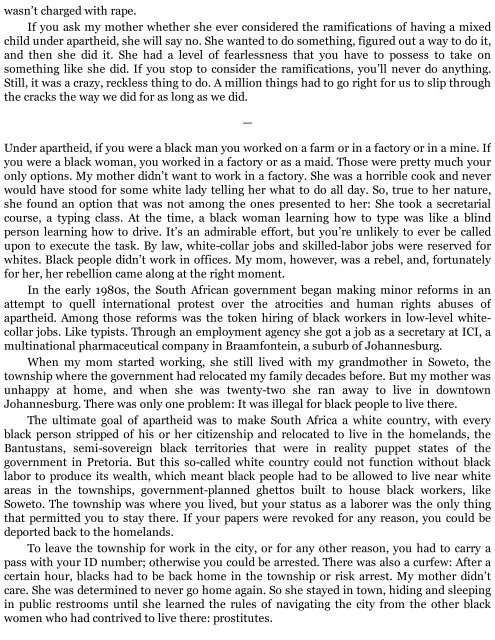Create successful ePaper yourself
Turn your PDF publications into a flip-book with our unique Google optimized e-Paper software.
wasn’t charged with rape.<br />
If you ask my mother whether she ever considered the ramifications of having a mixed<br />
child under apartheid, she will say no. She wanted to do something, figured out a way to do it,<br />
and then she did it. She had a level of fearlessness that you have to possess to take on<br />
something like she did. If you stop to consider the ramifications, you’ll never do anything.<br />
Still, it was a crazy, reckless thing to do. A million things had to go right for us to slip through<br />
the cracks the way we did for as long as we did.<br />
—<br />
Under apartheid, if you were a black man you worked on a farm or in a factory or in a mine. If<br />
you were a black woman, you worked in a factory or as a maid. Those were pretty much your<br />
only options. My mother didn’t want to work in a factory. She was a horrible cook and never<br />
would have stood for some white lady telling her what to do all day. So, true to her nature,<br />
she found an option that was not among the ones presented to her: She took a secretarial<br />
course, a typing class. At the time, a black woman learning how to type was like a blind<br />
person learning how to drive. It’s an admirable effort, but you’re unlikely to ever be called<br />
upon to execute the task. By law, white-collar jobs and skilled-labor jobs were reserved for<br />
whites. Black people didn’t work in offices. My mom, however, was a rebel, and, fortunately<br />
for her, her rebellion came along at the right moment.<br />
In the early 1980s, the South African government began making minor reforms in an<br />
attempt to quell international protest over the atrocities and human rights abuses of<br />
apartheid. Among those reforms was the token hiring of black workers in low-level whitecollar<br />
jobs. Like typists. Through an employment agency she got a job as a secretary at ICI, a<br />
multinational pharmaceutical company in Braamfontein, a suburb of Johannesburg.<br />
When my mom started working, she still lived with my grandmother in Soweto, the<br />
township where the government had relocated my family decades before. But my mother was<br />
unhappy at home, and when she was twenty-two she ran away to live in downtown<br />
Johannesburg. There was only one problem: It was illegal for black people to live there.<br />
The ultimate goal of apartheid was to make South Africa a white country, with every<br />
black person stripped of his or her citizenship and relocated to live in the homelands, the<br />
Bantustans, semi-sovereign black territories that were in reality puppet states of the<br />
government in Pretoria. But this so-called white country could not function without black<br />
labor to produce its wealth, which meant black people had to be allowed to live near white<br />
areas in the townships, government-planned ghettos built to house black workers, like<br />
Soweto. The township was where you lived, but your status as a laborer was the only thing<br />
that permitted you to stay there. If your papers were revoked for any reason, you could be<br />
deported back to the homelands.<br />
To leave the township for work in the city, or for any other reason, you had to carry a<br />
pass with your ID number; otherwise you could be arrested. There was also a curfew: After a<br />
certain hour, blacks had to be back home in the township or risk arrest. My mother didn’t<br />
care. She was determined to never go home again. So she stayed in town, hiding and sleeping<br />
in public restrooms until she learned the rules of navigating the city from the other black<br />
women who had contrived to live there: prostitutes.
















